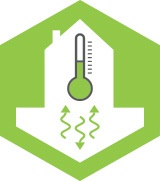 Low Carbon Heat Networks
Low Carbon Heat Networks
Low carbon and renewable energy sources will be critical to the development of the UK and its economy over the coming years.
Crewe is one of only six areas in the United Kingdom that have been identified by the British Geological Survey as having the potential to exploit deep geothermal energy.
This heat in the Cheshire Basin is stored in a hot sedimentary aquifer at depths of up to 5km. This provides an opportunity to tap into a low carbon heat source and displace heat currently generated by fossil fuels. The value of geothermal energy and its potential in Europe are outlined on the Geothermal District Heating (GEDH) website.
The Department for Energy and Climate Change (DECC) commissioned a report UK potential Deep Geothermal Review Study, Final Report (2013) (PDF, 123KB) which reviewed the data for Hot Sedimentary Aquifers with specific reference to the Cheshire Basin.
This work suggested that a temperature of 100°c could be reached at a depth of 4.5km. Crewe was identified as a location with sufficient heat demand to utilise a heat network served by geothermal energy but it was considered that electricity generation was not commercially feasible at this stage.
The journey to date
As part of the Ambition for All Sustainable Communities Strategy (2010-2025) (PDF, 3MB), the Council put forward a vision of including a step change in local production of energy from renewable sources, and has begun to explore routes that could be taken in delivering innovative and stable renewable energy within the Borough.
In May 2013 the Council commissioned Arup to undertake Cheshire East Energy Planning, Review of Geothermal Potential in Cheshire East (PDF, 1.2MB) to inform the business case development for this renewable energy source. In January 2014 the Council secured £198,000 of grant funding from the Heat Network Delivery Unit (HNDU) within DECC to commission a first phase of feasibility work to explore the potential for deep geothermal in Crewe.
In July 2014 the Council’s Cabinet made the decision to pursue deep geothermal with full, cross-party support. The document detailing this decision can be found on the Modern.Gov website
In January 2015 the Council’s Energy Framework (PDF, 3.3MB) identified Geothermal energy as a significant opportunity to help deliver affordable, sustainable and decentralised energy sources.
Feasibility
Following the award of HNDU funding, the Council undertook a detailed study into the technical feasibility of a deep geothermal district heating project centred on Leighton West Crewe (BRE, Greenfield November 2014). The Heat Network Mapping for Leighton West (PDF, 6.1MB) highlights that there is potential heat demand of 76 GWh/a in Crewe which could be met by the development of a geothermal heat network in the long term. At this stage the work is purely indicative and further work will be required to refine the business case to ensure sustainable demand and supply.
The analysis of the commercial potential of geothermal energy in the Cheshire Basin varies from -0.5% to +18% depending on the assumptions made. Cheshire East is continuing to refine the business case through detailed analysis to secure a commercial investment partner.
Geothermal projects elsewhere in Europe have progressed due to government and industry risk insurance initiatives to de-risk the initial drilling phase. As part of Cheshire East’s feasibility work a review of options for possible UK geothermal risk funding was undertaken and can be viewed in the Heat network mapping Risk Assessment (PDF, 1MB)
District heating
As part of its ambitions to deliver deep geothermal in Cheshire East, the Council is also working to identify opportunities for decentralised district heating networks across the Borough.
District heating uses underground insulated pipes to transport hot water from a central energy source to provide hot water and heating to homes and businesses in the network.
Under DECCs Heat Network Delivery Unit, the Council has received funding to undertake feasibility studies to identify opportunities for district heating networks in Crewe Town Centre, Macclesfield Town Centre, and rural-off grid gas areas.
The results of these studies will now be reviewed and business cases developed.
The studies can be found here:
Geothermal and heat network resources
In the news
Document accessibility
Contact us
Page last reviewed: 24 June 2021
Thank you for your feedback.